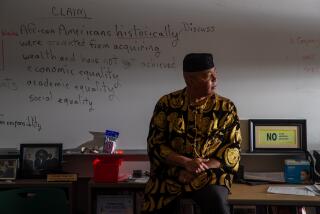War and Peace
- Share via
It has been noted before that one of the hardest things to do is to think, which is why so few people bother to do it. What is especially perplexing is that too often there is not enough analytical thinking where you would most expect to find it--on college campuses.
What we find somewhat encouraging is that some colleges are starting to think about that. And that a few campuses, like Chapman College in Orange, have even given the problem deep enough thought to come up with some innovative ideas.
At Chapman, starting with the fall semester in September, all 400 freshman will have to attend a 50-minute class three days a week to study, think through and interpret by way of reading, writing, lectures, debates and films one universal subject that affects all students, no matter what major they are pursuing. The subject is war and peace.
The course will look as far back as the Peloponnesian War in 431-404 BC, and will be as current as the Vietnam War. Students will explore the causes of war, the process itself and the results. They will also investigate the quest for peace: what constitutes peace, how to achieve it and why civilization keeps failing to find it.
Campuses across the nation have noticed that students have been increasingly turning to courses that will prepare them for their chosen careers and have been avoiding the humanities and courses that challenge them to think critically.
The seminars on war and peace planned at Chapman can help overcome that, and will combine all of the college’s disciplines, from history to music, in studying the special topic. And instruction won’t be limited to campus personnel. Speakers from other campuses and national figures--like former U.S. Senator and presidential candidate Eugene McCarthy, who opposed the war in Vietnam, and Norman Podhoretz, a neo-conservative and editor of Commentary magazine--will take part in the program.
Chapman College may be the only campus in Southern California to require its freshman class to meet regularly in small groups to study and analyze a subject of such great concern. It would help if other campuses took a similar approach.
More to Read
Sign up for Essential California
The most important California stories and recommendations in your inbox every morning.
You may occasionally receive promotional content from the Los Angeles Times.













